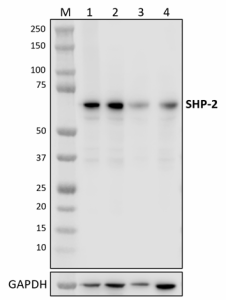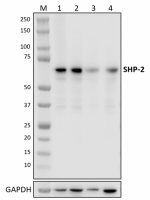- Clone
- A20016A (See other available formats)
- Regulatory Status
- RUO
- Other Names
- CFC, NS1, JMML, SHP2, BPTP3, PTP2C, METCDS, PTP-1D, SH-PTP2, SH-PTP3, Syp, Protein Tyrosine Phosphatase Non-Receptor Type 11, SH2 Domain-Containing Protein Tyrosine Phosphatase 2
- Isotype
- Mouse IgG1, κ
- Ave. Rating
- Submit a Review
- Product Citations
- publications

-

Total cell lysates (15 µg total protein) from K-562 (Lane 1), HeLa (Lane 2), HEK293 (Lane 3), and NIH/3T3 (Lane 4) were resolved by 4-12 % Bis-Tris gel electrophoresis, transferred to a PVDF membrane, and probed with 1 μg/mL of anti-SHP-2 antibody overnight at 4°C. Proteins were visualized by chemiluminescence detection using HRP goat anti-mouse IgG antibody (Cat. No. 405306) at 1:3000 dilution. Direct-Blot™ HRP anti-GAPDH antibody (Cat. No. 607904) was used as a loading control at 1:50,000 dilution (lower). Western-Ready™ ECL Substrate Premium Kit (Cat. No. 426319) was used as a detection reagent. Lane M: Molecular weight ladder.
| Cat # | Size | Price | Quantity Check Availability | Save | ||
|---|---|---|---|---|---|---|
| 948201 | 25 µg | 95€ | ||||
| 948202 | 100 µg | 235€ | ||||
Src homology-2-containing protein tyrosine phosphatase 2 (SHP-2) protein, encoded by PTPN11 gene, is a well-known oncogenic protein tyrosine phosphatase. SHP-2 regulates cellular functions by dephosphorylating targets downstream of PD1, EGFRvIII, HGF receptor, and cytokine receptors. Cellular processes controlled by SHP-2 include mitotic cycle, cell growth, differentiation, and oncogenesis. SHP-2 has been recognized as a potential therapeutic target for cancers including breast cancer, lung cancer, leukemia, gastric cancer, and oral cancer.
Product DetailsProduct Details
- Verified Reactivity
- Human, Mouse
- Antibody Type
- Monoclonal
- Host Species
- Mouse
- Immunogen
- Synthetic peptide from human SHP-2
- Formulation
- Phosphate-buffered solution, pH 7.2, containing 0.09% sodium azide
- Preparation
- The antibody was purified by affinity chromatography.
- Concentration
- 0.5 mg/mL
- Storage & Handling
- The antibody solution should be stored undiluted between 2°C and 8°C.
- Application
-
WB - Quality tested
- Recommended Usage
-
Each lot of this antibody is quality control tested by western blotting. For western blotting, the suggested use of this reagent is 0.5 - 1.0 µg/mL. It is recommended that the reagent be titrated for optimal performance for each application.
- Application Notes
-
This antibody recognizes endogenous human and mouse SHP-2 proteins in K-562, HeLa, HEK293, and NIH/3T3 cell lysates by WB.
- Product Citations
-
- RRID
-
AB_2894536 (BioLegend Cat. No. 948201)
AB_2894536 (BioLegend Cat. No. 948202)
Antigen Details
- Structure
- SHP-2 is a 593 amino acid protein with a molecular mass of 68 kD.
- Distribution
-
Cytoplasm and Nucleus
- Function
- SHP-2 regulates cell proliferation, apoptosis, invasion, and metastasis.
- Interaction
- SHP-2 interacts with PD1, EGFR, HGF receptor, RET, FGFR2, FGFR3, PI3K/AKT, and TLR3 signaling pathways.
- Cell Type
- Lymphocytes, T cells, Th1
- Biology Area
- Cell Biology, Cell Proliferation and Viability, Immuno-Oncology, Immunology
- Molecular Family
- Protein Kinases/Phosphatase
- Antigen References
-
- Hao C, et al. 2020. Oncogene. 39:7166-7180.
- Marie D., et al. 2008. Cell Signal. 20:453-9.
- Cheng Kui QU. 2000. Cell Research. 10:279-288.
- Gene ID
- 5781 View all products for this Gene ID
- UniProt
- View information about SHP-2 on UniProt.org
Related FAQs
Other Formats
View All SHP-2 Reagents Request Custom Conjugation| Description | Clone | Applications |
|---|---|---|
| Purified anti-SHP-2 | A20016A | WB |
Compare Data Across All Formats
This data display is provided for general comparisons between formats.
Your actual data may vary due to variations in samples, target cells, instruments and their settings, staining conditions, and other factors.
If you need assistance with selecting the best format contact our expert technical support team.
-
Purified anti-SHP-2

Total cell lysates (15 µg total protein) from K-562 (Lane 1)...
 Login / Register
Login / Register 







Follow Us